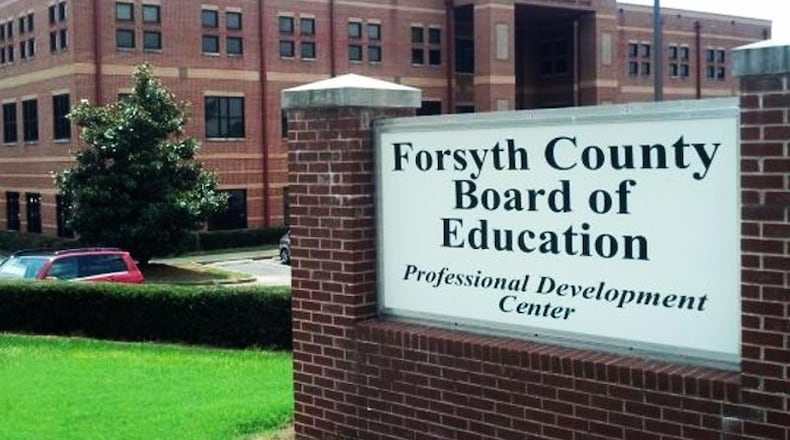Diversity, equity and inclusion may seem admirable goals, but they became a flashpoint Tuesday night at a jammed school board meeting in Forsyth County.
As with most school systems, Forsyth created a DEI — diversity, equity and inclusion — plan that calls for ensuring, as superintendent Jeff Bearden has explained, “a sense of belonging, respect, and acceptance in our schools and in our community.”
The DEI plan — recommended to Forsyth in 2017 by its accrediting agency — has garnered fresh attention from conservative political organizations that see the plans as anti-American and as a way to energize their base. Such plans are under fire nationwide. A similar turnout is expected at Thursday’s Cherokee County school board meeting.
Opponents and proponents voiced their views during an 80-minute public commenting portion, during which Forsyth board members listened in silence. No action was taken on the DEI plan.
Any focus on racial and social justice issues in their children’s classrooms alarmed some parents, who, echoing the position of conservative political groups including the Forsyth County Tea Party, insisted the DEI plan is rooted in Marxism and casts white students as oppressors and minority students as victims.
Many critics disdained what they called the foundation of DEI, critical race theory, which is based on a scholarly body of work that says race infuses both our view of the world and our understanding of it. Critical race theory suggests racism taints all aspects of American life, from our courts to our schools.
“Let’s be totally clear on what diversity, equity and inclusion training is — a Marxist Trojan Horse disguised with sunshine, rainbows, and a bow on top,” said Hunter Hill, chairman of the Republican Party of Forsyth County, who said he was speaking as an individual. “The DEI Trojan horse is approaching a slippery slope and it is happening too quick for comfort. At the end of this slippery slope is critical race theory, white repentance, and the McDonaldization of America’s students. Instead of creating critical thinkers that love and exemplify their country, we’re cultivating victims that see imaginary oppression in every corner... eventually breeding resentment and revolution.”
His comments were echoed by Forsyth Tea Party chairman Bobby Donnelly, who told the school board, “We’ve seen things in the paper like transgender homecoming queens and DEI. We are paying attention and we are going to make sure our Republican and conservative values match what is being taught in our school system.”
While several parents defended the school district’s commitment to diversity, it was Forsyth students who mounted the most impassioned arguments in favor of the DEI plan
Damian Galvan, a student at the Alliance Academy for Innovation of Cumming, talked about how he and his best friend “never had a teacher as a mentor that looked like us. I have countless friends that are part of the LGBTQIA community who don’t have counselors to talk about their experiences. This plan does not yell you are different; it yells you are not different, and you are welcome in this county.”
South Forsyth High School senior Katy Gates responded to critics who urged the school board to stick to math and science and history and stay away from values.
“I learned more than math, science reading and history in Forsyth schools,” she said. “I learned how to speak up for myself. I learned how to communicate with a variety of people. I learned how to create change. I learned values of kindness, love thy neighbor.”
To explain the importance of DEI, Gates reached back to her third-grade classroom where her teacher Angana Ghate announced early on: “I treat everyone in this room fairly, but that doesn’t mean that I treat everyone the same. Because each of you is so very unique that to treat you the same would be to treat you unfairly. But I will give each of you the different resources you need to have the same chance to succeed. "
That, said Gates, sums up the goals of Forsyth’s diversity, equity and inclusion plan, adding, “There is no agenda behind it other than creating space where every child feels valued and represented and is given the tools that they need to succeed. In such a divided time, can’t that be something we all agree on?”
About the Author
The Latest
Featured



